Motorcycle crashes can turn your world upside down. Each year, thousands of riders face this scary situation. This guide will walk you through 12 vital steps to take after a motorcycle accident.
It’s your roadmap to safety, health, and legal protection. Ready to learn what to do after a motorcycle accident?
Key Takeaways
Get to safety and call 911 right away after a motorcycle crash. Check yourself for injuries and stay put if you can’t move.
Take lots of photos at the accident scene. Capture damage, road signs, and weather conditions. These details can help your case later.
See a doctor even if you feel fine. Hidden injuries may show up later. Keep all medical records and track your recovery in a journal.
Don’t admit fault or negotiate with other parties. Let your lawyer handle talks with insurance companies to protect your rights.
Contact a motorcycle accident lawyer quickly. They can guide you through the claims process and fight for fair compensation.
Table of Contents
Immediate Steps Following a Motorcycle Accident
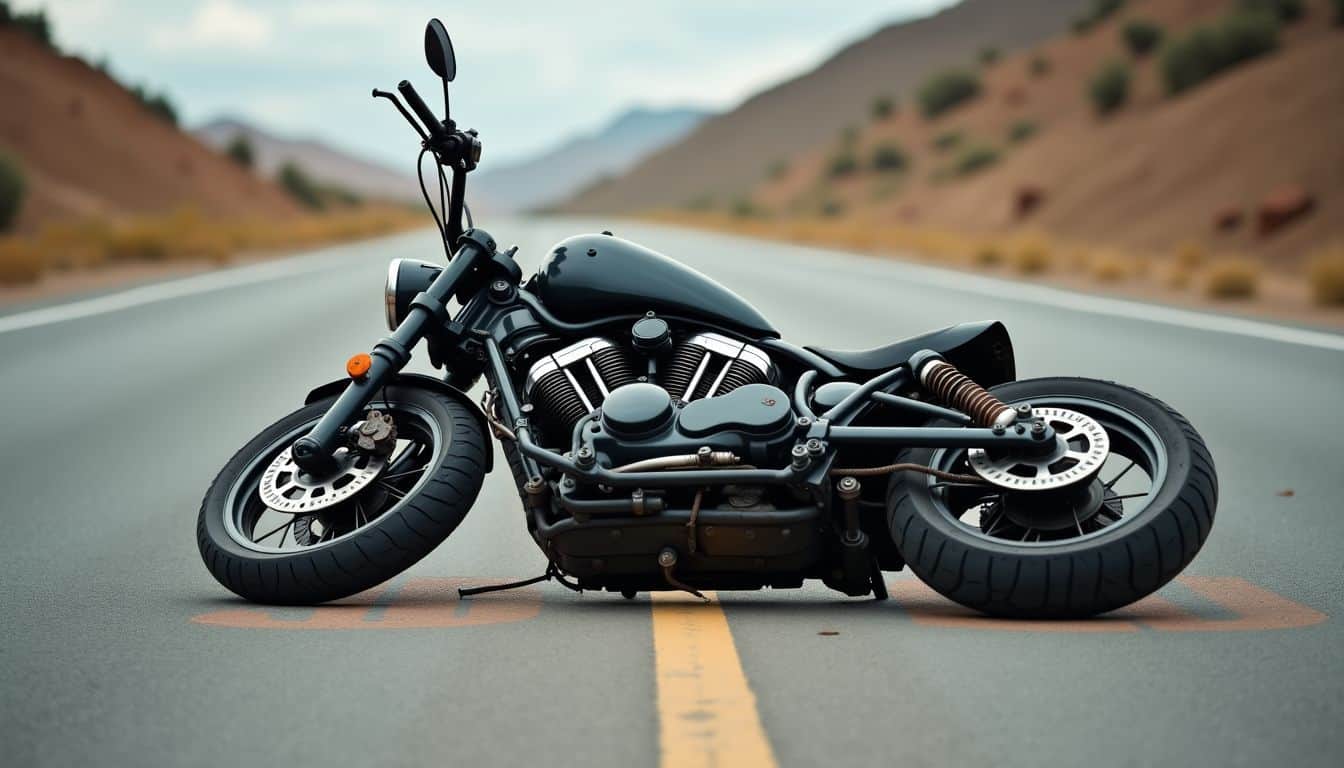
After a motorcycle crash, your first moves are crucial. Quick thinking can save lives and protect your rights – so let’s dive into what you need to do right away.
Relocate to Safety

After a motorcycle crash, your first move is crucial. Get off the road fast! If you can walk, head to the shoulder or sidewalk. Can’t move? Don’t panic. Stay put and wave your arms to catch other drivers’ eyes.
Keep your helmet and gear on – they’re still protecting you.
Safety is key, but so is smart thinking. Once you’re out of harm’s way, take a deep breath. Look around. Are you hurt? Is anyone else? Dial 911 if needed. Then, start gathering info.
Snap pics of the scene, jot down what happened. These details could be gold later on.
Your safety is the top priority after a motorcycle accident. Everything else can wait.
Assess Personal Injuries
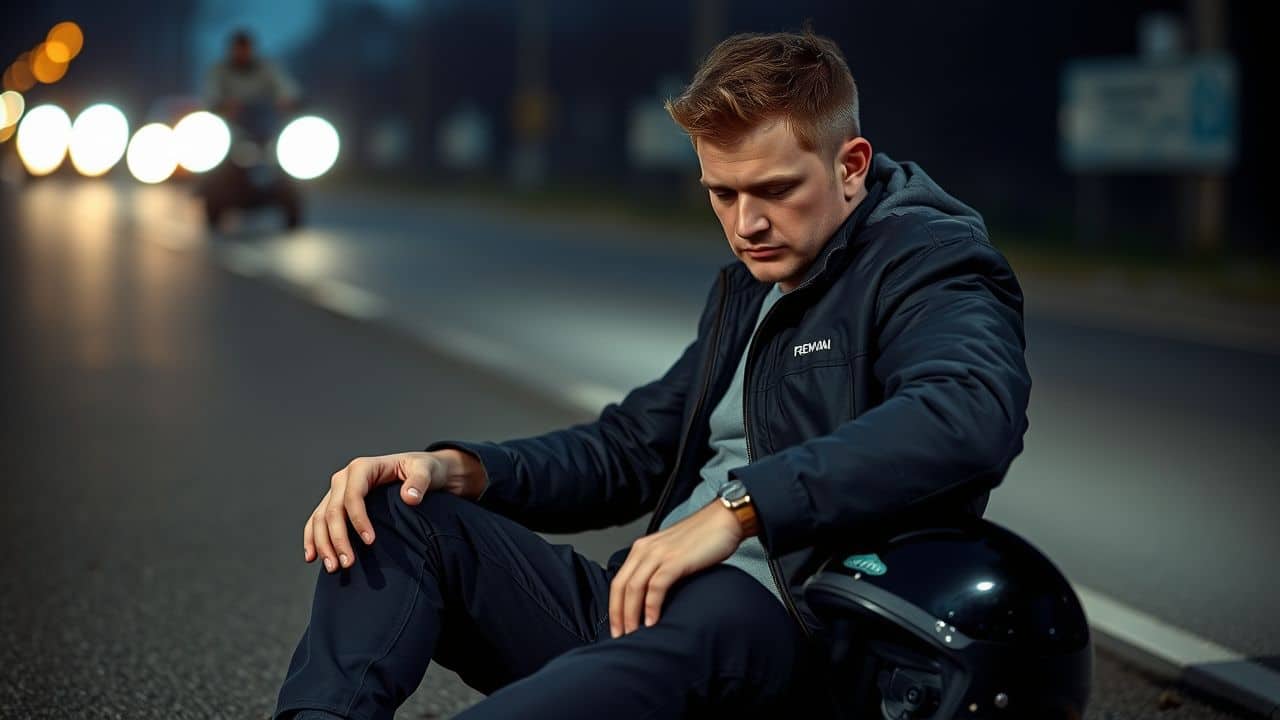
Check yourself for injuries right away. It’s easy to miss some hurts when your adrenaline’s pumping. Start with your head and work down. Look for cuts, bruises, or spots that really hurt.
Don’t ignore small aches – they might be signs of bigger problems. If you’re dizzy or your vision’s blurry, you might have a concussion. That needs quick medical help.
I once thought I was fine after a spill, but my arm started throbbing hours later. Turns out, I had a hairline fracture! So trust me, it’s key to spot all injuries ASAP. This helps with your recovery and any future motorcycle accidents claim.
Jot down your symptoms in a pain journal. It’ll help docs treat you better and back up your case if needed. Quick action now saves headaches later – both the medical and legal kind!
Contact Law Enforcement

Call the cops right away after a motorcycle crash. It’s crucial. They’ll come to the scene and make an official report. This report is gold – it’s a key piece of evidence if you need to file a claim later.
The police will gather all the facts and details about what happened. They’ll talk to everyone involved and any witnesses around.
Don’t skip this step, even if the crash seems minor. Sometimes injuries or damage aren’t obvious at first. The police report will back up your story if things get complicated down the road.
Plus, having law enforcement there can help keep everyone calm and honest. After you’ve called the police, it’s time to think about gathering important info at the accident scene.
Collecting Essential Information at the Accident Scene
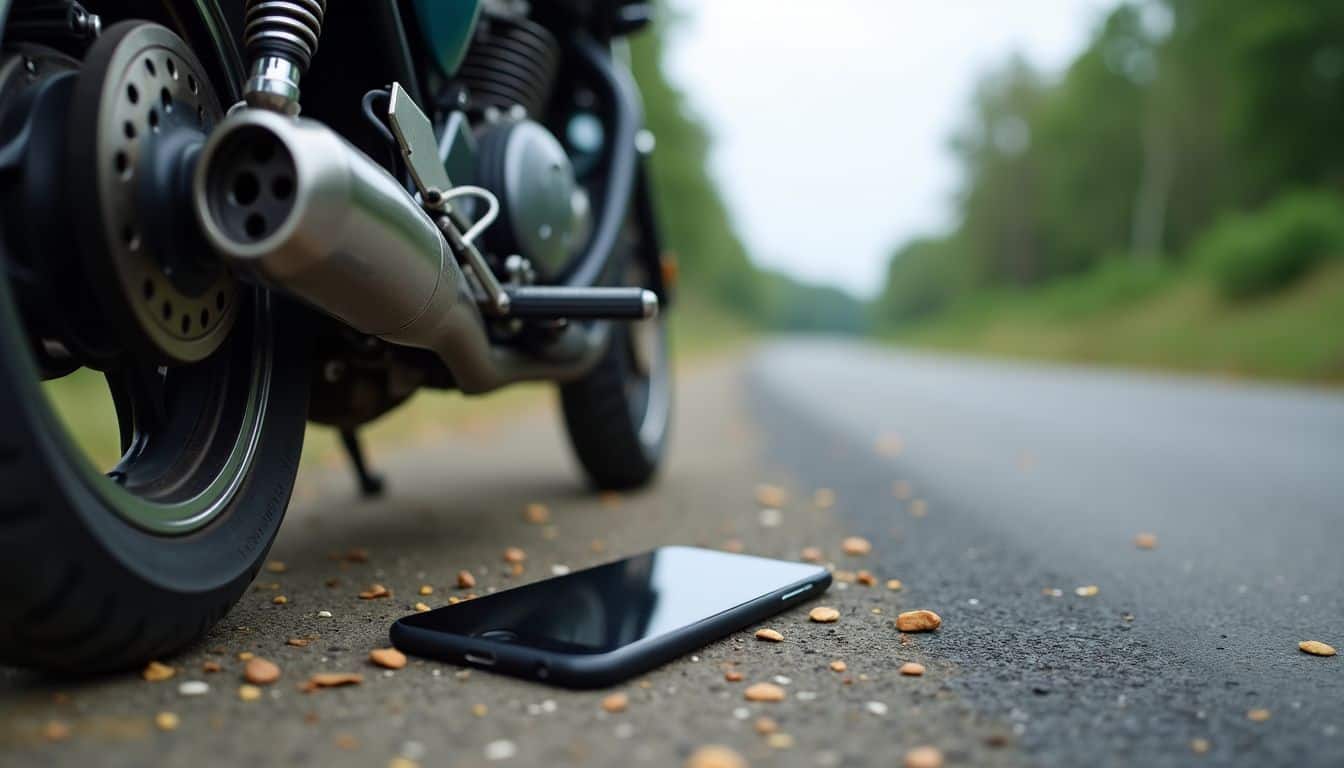
After a motorcycle crash, you’ve got to play detective. Grab your phone and snap pics of everything – the damage, the scene, even the weather. This info’s gold when dealing with insurance folks later.
Exchange Contact and Insurance Information
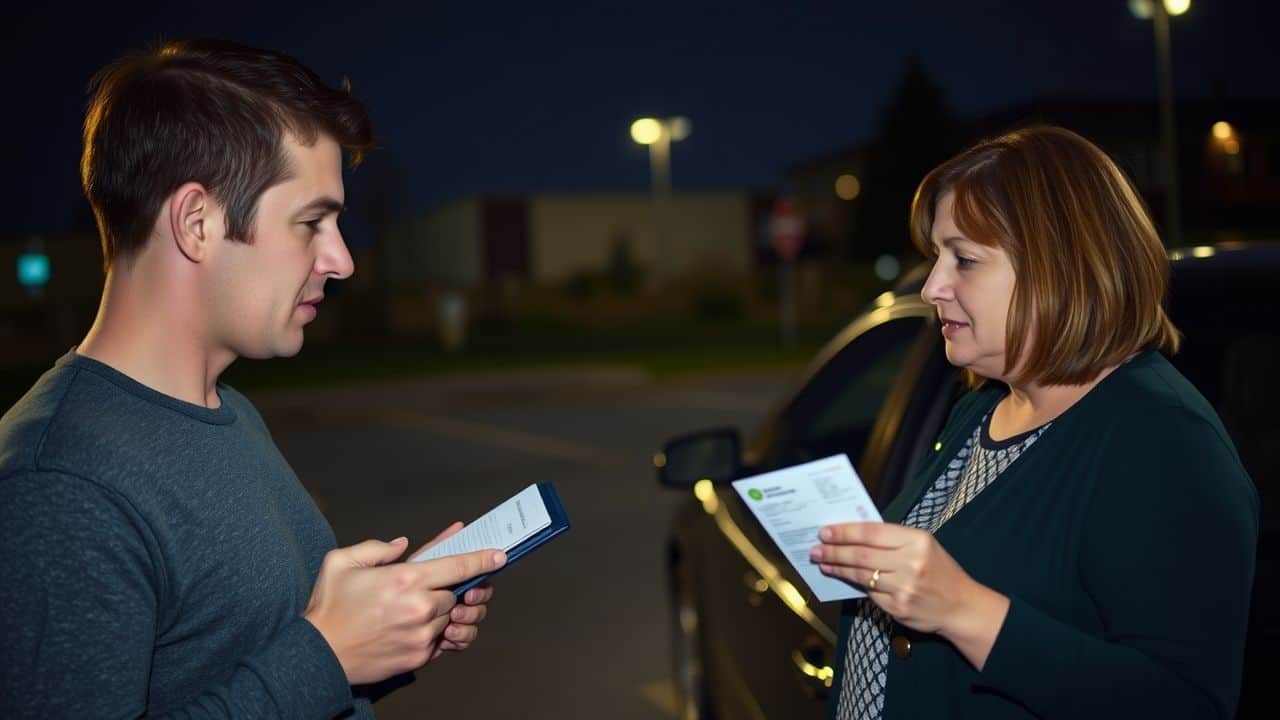
After a crash, swap info with everyone involved. Get names, phone numbers, and addresses. Don’t forget insurance details too. It’s crucial to jot down policy numbers and company names.
I once skipped this step and regretted it big time. Trust me, you’ll thank yourself later.
Snap pics of driver’s licenses and insurance cards if you can. It’s quicker and more accurate than writing. Plus, it’s handy if someone gives false info. Guys who ride motorcycles know the importance of being thorough here.
If the other driver won’t share, stay calm and wait for the cops. They’ll help you get what you need.
Photograph the Accident Site
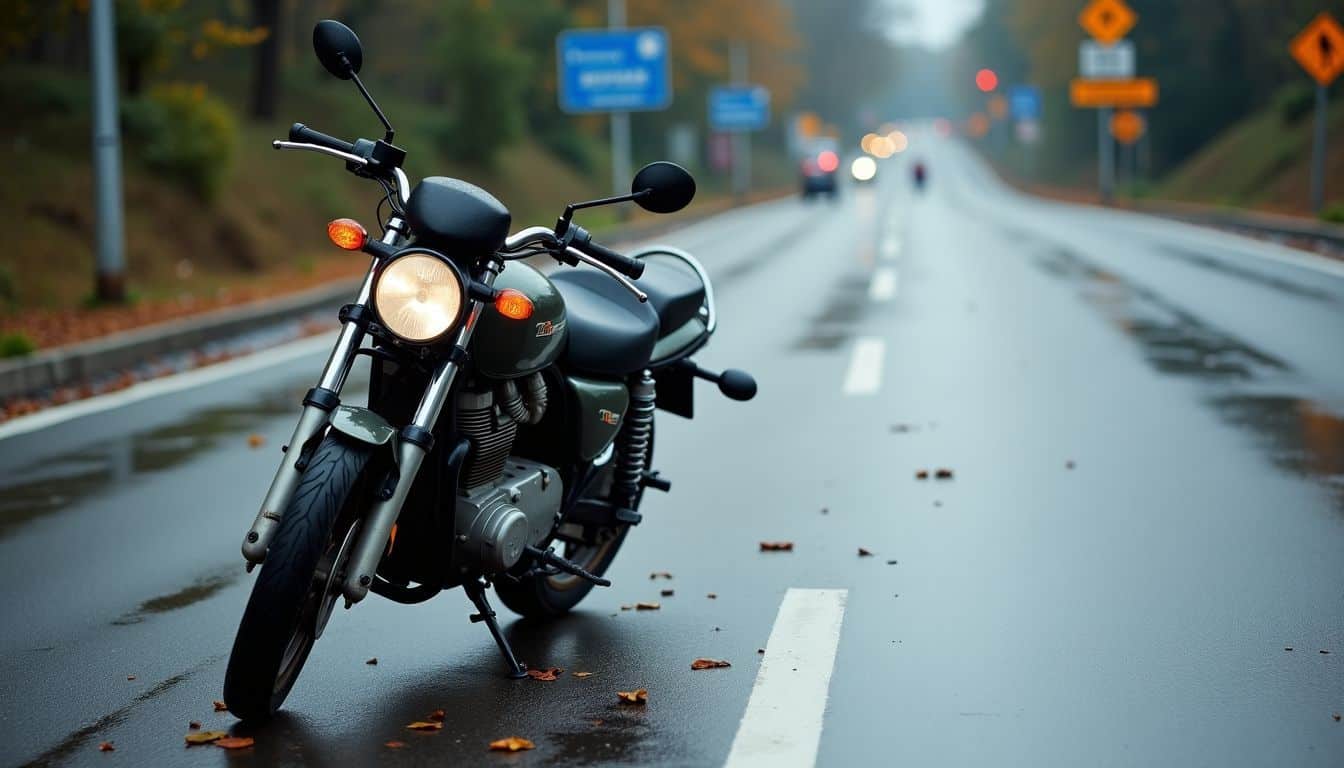
Grab your phone and snap away! Pictures tell a story when words fail. At the crash site, take loads of photos. Capture the damage to your bike and other vehicles. Don’t forget road signs, skid marks, and debris.
These details can make or break your case later. I once helped a buddy who thought he’d lost his claim. His photos showed a hidden stop sign the other driver missed. Game-changer!
A picture is worth a thousand words, but in a motorcycle accident, it could be worth thousands of dollars.
Weather and lighting matter too. Snap pics of wet roads or glaring sun. Use your phone’s timestamp feature to show when each photo was taken. This builds a clear timeline of events.
Pro tip: Take more photos than you think you need. You can’t go back in time, but you can always delete extras later.
Obtain Witness Accounts
After snapping photos, turn your attention to the people around you. Eyewitnesses can make or break your case. Their fresh memories of what happened are gold. Don’t be shy – approach anyone who saw the crash and ask for their story.
Get their names and phone numbers too. These folks might be your secret weapon later on.
I once helped a buddy after his bike wreck. We talked to a lady who saw the whole thing. Her account proved the other driver ran a red light. Without her, my friend might’ve been stuck with the blame.
So, chat up those witnesses! Their words could save your bacon down the road.
Medical Evaluation and Record Keeping

After a crash, getting checked out and keeping good records is key. Your health comes first, but those papers might save your bacon later. Want to know more about staying on top of your medical stuff? Keep reading!
Seek Immediate Medical Assessment

Get checked out by a doc right away, guys. Even if you feel fine after a spill, hidden injuries could be hiding. I once thought I was okay after a crash, but ended up with a bad concussion.
Don’t try to be tough – your health matters more than your pride.
Better safe than sorry with your body.
Quick medical care helps catch issues early. It also creates a paper trail for insurance claims. Tell the doctor everything – even small aches. They’ll make a care plan to get you back on your bike faster.
Your body’s been through a lot. Give it the attention it needs.
Maintain Medical Treatment Records
Guys, let’s chat about keeping your medical records after a motorcycle crash. It’s tough, but it’s essential. Every doctor visit, every pill, every therapy session – write it down.
Why? Because these notes are invaluable when dealing with insurance or legal matters. I learned this firsthand after my own accident. I thought I’d remember everything, but wow, was I mistaken.
Weeks later, I was struggling to recall dates and details. Don’t repeat my error.
Here’s a tip: use your phone. Take photos of prescriptions, bills, and doctor’s notes. Make a folder just for this. It’s much easier than sorting through papers. And believe me, your future self will appreciate it.
This isn’t just about finances – it’s about getting the care you need and deserve. So, keep those records as if your recovery depends on it… because it just might.
Track Your Recovery Progress
Keep a journal of your recovery. Write down how you feel each day. Note any pain, stiffness, or other issues. This helps you see your progress over time. It’s also useful if you need to talk to doctors or lawyers later.
Take photos of your injuries as they heal. These visual records can be powerful proof if you need to make a claim.
Don’t skip follow-up medical visits. They’re essential to getting better and protecting your rights. Your doctor can spot problems early and adjust your treatment. Plus, these visits create a paper trail of your injuries and recovery.
This can be crucial if you need to fight for fair compensation later. Your health comes first. But good records can help you get the support you deserve.
Legal Procedures After a Motorcycle Accident

After a motorcycle crash, you’ll need to deal with some legal stuff. It’s not fun, but it’s crucial to protect yourself and get what you deserve.
Inform Your Insurance Provider
Call your insurance company immediately after a motorcycle accident. They need to know what happened. Give them the facts about the incident – no need to soften things. Just tell it straight.
Your policy might have rules about when you have to report accidents. Don’t miss those deadlines, or you could lose out on coverage.
Honesty is the best policy, especially with your insurance company.
Being upfront with your insurer helps your case. They’ll work faster to process your claim if you give them the full story from the start. Plus, it’s much easier to remember details right after the accident.
So pick up that phone and make the call. Your future self will thank you for handling this important step quickly.
Consult a Motorcycle Accident Lawyer
Guys, let’s talk about getting a lawyer after your bike crash. It’s not just about having someone in a suit – it’s about having a pro who knows the ins and outs of motorcycle accidents.
These lawyers are like your personal pit crew, fixing up the legal mess while you heal. They’ll help you chase down fair pay for your injuries, which is huge when medical bills start piling up.
Plus, they speak “insurance-ese” fluently, so you don’t have to deal with that headache.
Don’t fall for the trap of settling quick without legal backup. Insurance companies might try to lowball you faster than you can say “road rash.” A good motorcycle accident attorney will fight for your rights and make sure you’re not left high and dry.
They’ll handle the paperwork jungle, negotiate with tough insurers, and even take your case to court if needed. It’s like having a skilled rider lead you through tricky legal turns – way better than going solo.
Learn About the Claims Process
Getting a handle on the claims process is key after a motorcycle crash. First, you’ll need to file a claim with your insurance company. They’ll ask for details about the accident, your injuries, and any damage to your bike.
Be ready to share police reports, medical records, and repair estimates. The process can take time – from a few weeks to several months. It’s not always easy, so stay patient and keep good records.
If the other driver was at fault, their insurance might cover your costs. But if they’re uninsured or it’s a hit-and-run, you might need to use your own coverage.
Don’t go it alone if things get complicated. A lawyer who knows motorcycle accidents can be a big help. They’ll fight for your rights and make sure you get a fair deal. Insurance companies often try to lowball payouts, but a good attorney can push back.
They’ll handle the paperwork, negotiate with insurers, and even take your case to court if needed. Just keep in mind – time is important. Most states have limits on how long you can wait to file a claim or lawsuit.
So don’t wait – get started as soon as you can.
Actions to Avoid After a Motorcycle Accident

After a motorcycle crash, you might feel shaken up. But watch out – some actions can hurt your case later on. Let’s dive into what you should steer clear of… it could save you a heap of trouble down the road.
Refrain from Admitting Fault
Keep your lips sealed about fault after a crash. It’s tempting to say “sorry” or explain what happened, but don’t. Those words can bite you later. I learned this the hard way after my own spill.
Even a simple “my bad” could mess up your case down the road. Stick to the facts when talking to cops or others at the scene. Give a clear account without pointing fingers – at yourself or anyone else.
Your words carry weight after an accident. Insurance companies and lawyers will pick apart everything you say. So, play it cool and let the pros figure out who’s to blame. Focus on getting help and swapping info instead.
Trust me, staying quiet about fault now can save you big headaches later. It might feel weird, but it’s the smart move to protect yourself.
Avoid Direct Negotiations with Other Parties
Don’t talk to the other guy’s insurance company on your own. They’re not your pals. Their job is to pay you as little as possible. I learned this the hard way after my bike crash last year.
The adjuster seemed friendly, but he was fishing for info to use against me. Stick to the facts with cops and your own insurer. For everyone else, zip it and let your lawyer do the talking.
You might think you can handle things yourself, but trust me – it’s a bad idea. The other side has tricks up their sleeve. They’ll try to twist your words or get you to say something that hurts your case.
I’ve seen good guys lose out on fair compensation because they said too much. Your best bet? Clam up and pass the buck to a pro who knows the game.
Do Not Postpone Legal Advice
Talking to the other party’s insurance can be tricky. It’s best to let a pro handle it. Now, let’s talk about getting legal help fast. Don’t wait to call a lawyer after your crash.
Time is not on your side here, guys. The sooner you get legal advice, the better your chances of a fair deal. Lawyers know the ins and outs of these cases. They can guide you through the mess of paperwork and deadlines.
I learned this the hard way after my own bike wreck. I thought I could handle it alone. Big mistake. By the time I called a lawyer, I’d already made some slip-ups that hurt my case.
Don’t be like me. Get help right away. A good lawyer will fight for your rights and make sure you don’t get lowballed by insurance companies. They’ll also keep track of all those pesky deadlines for you.
Trust me, it’s worth it.
People Also Ask
What’s the first thing I should do after a motorcycle crash?
Stay calm and check for injuries. If you’re hurt, don’t move. Call 911 for help. If you can, move to a safe spot away from traffic. Your health comes first, so don’t worry about anything else yet.
Should I always go to the ER after a bike accident?
Yes, even if you feel fine. Some injuries, like concussions, aren’t obvious right away. The ER can spot hidden problems. Plus, having a medical record helps if you need to file a personal injury claim later.
Do I need to talk to the other driver’s insurance company?
Nope! Let your lawyer handle that. Insurance companies can twist your words. They’re not on your side. Your personal injury attorney will know how to deal with them and protect your rights.
What if the driver who hit me doesn’t have insurance?
Don’t panic. Your own insurance might cover you through uninsured motorist coverage. If not, a good lawyer can explore other options. You might still get compensation for your injuries and bike damage.
How long do I have to file a lawsuit after a motorcycle accident?
It depends on your state’s laws. Some give you just a year, others up to six. But don’t wait! Evidence can disappear, and witnesses forget things. Talk to a lawyer as soon as you can to protect your rights.
What if I’m partly at fault for the accident?
You might still get some money. Many states use “comparative negligence” rules. This means you can still recover damages, but they might be reduced based on your share of fault. A skilled attorney can help you navigate this tricky area.
References
https://www.motorcyclesdata.com/2024/11/15/what-to-do-after-having-a-motorcycle-accident/
https://wfirm.com/how-to-handle-injuries-from-a-motorcycle-accident-a-comprehensive-guide/ (2024-09-17)
https://www.straccilaw.com/blog/steps-to-take-after-a-motorcycle-accident-in-indiana
https://adrtimes.com/how-to-document-evidence-after-a-motorcycle-accident/
https://www.michlesbooth.com/blog/steps-to-take-after-a-motorcycle-accident/
https://www.themlgteam.com/blog/what-to-do-after-a-motorcycle-accident/
https://autojusticeattorney.com/recovery-steps-motorcycle-accident/
https://becklawmo.com/blog/steps-to-take-after-a-missouri-motorcycle-accident/
https://www.parkchenaur.com/what-to-do-after-a-motorcycle-accident/
https://www.brownandcrouppen.com/blog/what-to-do-after-a-motorcycle-accident/ (2024-10-10)
https://mclachlan-law.com/blog/what-should-you-not-do-after-a-motorcycle-accident/
